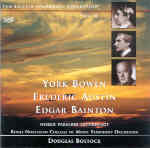York Bowen’s Second Symphony of 1911 has its charms, most of them involving the way he cribs from Tchaikovsky without ever approaching that master’s gift for writing expressive, characterful tunes. The second movement, for example, has a solemn introduction leading to a lengthy horn solo, as in Tchaikovsky’s Fifth, while the deliciously scored scherzo sounds like a missing bit from The Nutcracker. The outer movements attempt Tchaikovskian heights of drama but never really come close, and Bowen lays on the bass drum in both loud and soft contexts with very excessive enthusiasm. Still, it’s a fun piece to hear once, and the same holds true for Frederic Austin’s Symphonic Rhapsody “Spring”, a sweet, effectively scored pastoral essay that does exactly what the title says it should, and then ends before boredom sets in. As for Edgar Bainton’s tone poem Genesis, this minor talent has about as much business taking on a subject of this magnitude as Bernard Shaw credited to Parry for setting to music the story of Job. It begins in darkness and ends in light and takes a dull 20 minutes getting there. The performances, though, have the right kind of confidence and commitment, and they’re well recorded. Certainly the symphony deserves an outing now and then, though whether you’ll want to pay to own it forever is another matter altogether.
































